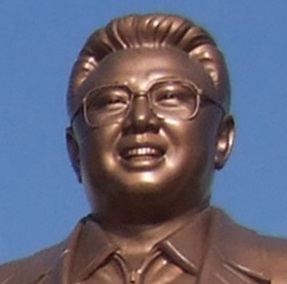
Epithets used to describe former North Korean leader Kim Jong-il in state media:
- Superior Person
- Dear Leader
- Respected Leader
- Wise Leader
- Brilliant Leader
- Unique Leader
- Dear Leader, Who Is a Perfect Incarnation of the Appearance That a Leader Should Have
- Commander-in-Chief
- Great Leader
- Father of the People
- Sun of the Communist Future
- Shining Star of Paektu Mountain
- Guiding Sun Ray
- Leader of the Revolutionary Armed Forces
- Guarantee of the Fatherland’s Unification
- Symbol of the Fatherland’s Unification
- Fate of the Nation
- Beloved Father
- Leader of the Party, the Country, and the Army
- Great Leader of our Party and of our Nation
- Great General
- Beloved and Respected General
- Great Leader
- Beloved and Respected Leader
- Ever-Victorious, Iron-Willed Commander
- Sun of Socialism
- Sun of the Nation
- The Great Sun of Life
- Great Sun of The Nation
- Father of the Nation
- World Leader of the 21st Century
- Peerless Leader
- Bright Sun of the 21st Century
- Great Sun of the 21st Century
- Leader of the 21st Century
- Amazing Politician
- Great Man, Who Descended From Heaven
- Glorious General, Who Descended From Heaven
- Supreme Leader of the Nation
- Bright Sun of Juche
- Leader of the Party and the People
- Great Marshal
- Invincible and Triumphant General
- Dear Father
- Guiding Star of the 21st Century
- Great Man, Who Is a Man of Deeds
- Great Defender
- Savior
- Mastermind of the Revolution
- Highest Incarnation of the Revolutionary Comradeship
- His Excellency
Wikipedia keeps a list. When Kim died in 2011, he was named “General Secretary for Eternity.” According to the state-run Korean Central News Agency, the decision was based on “the unanimous will and desire of all the party members and other people.”
